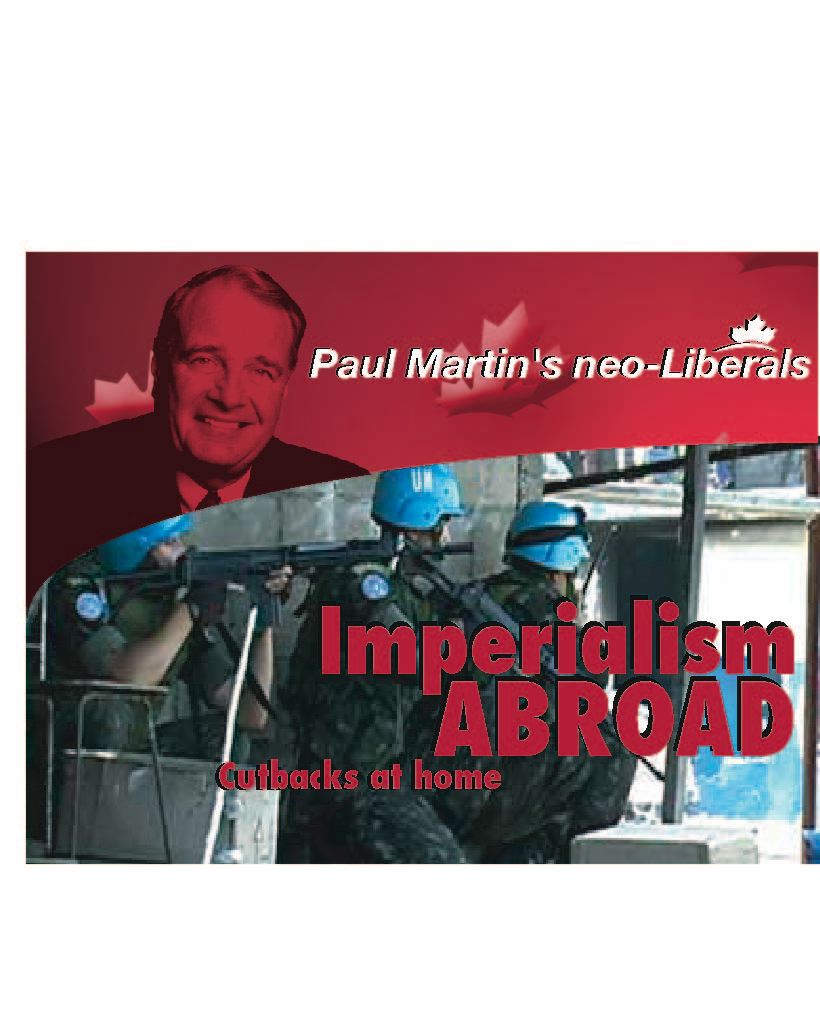Federal Election 2006
Foreign Policy Questions:
Why won’t our leaders talk about what we’re doing there?
Last Tuesday, Liberal prime minister Paul Martin made his pre-election stop in Victoria, meeting with supporters at a rally at the Hotel Grand Pacific. There, in what must have felt like a strange replay of countless such events across the country as we head towards the January 23 election, Martin delivered a short speech with a few feel-good messages and several attacks on conservative leader Stephen Harper. Harper, he says, would integrate our country even more deeply with the United States—something many Canadians don’t want to see happen.
And yet, one particular aspect of Canada’s foreign affairs points to exactly that sort of integration with the States. Our recent dubious record in Haiti, and our role in Afghanistan, was something Martin didn’t mention, and there was no opportunity for reporters to ask about.
In fact, there has been little mention of Haiti in the entire tightly managed campaign so far, even though Mark Bourque, a retired Canadian RCMP officer, died there in recent weeks, shot in the streets of Port au Prince. Not even the suicide this weekend of Urano Texeira da Matta Bacellar, the Brazilian leader of the UN forces in Haiti, caused a blip in Canadian political circles. Nor has the steady criticism from peace activists who question Canada’s involvement in either country.
A call to the Liberal party’s press office in Ottawa confirms the party is trying to keep Haiti out of the election. “It’s not a political thing,” says Kristen Connolly, who describes herself as the “press office answering-the-phone lady.” Questions should be directed to the foreign affairs department, she says. “It’s government comment as opposed to politics.”
That seems odd to a number of observers, including Victoria’s outgoing MP David Anderson, a one-time foreign-service officer. “No foreign affairs issues have come up in the campaign, which I find very surprising,” he says. “I find it very strange.”
The election should include a close analysis of Canada’s foreign policy, Anderson says, and yet, the closest we’ve come during this campaign is politicians talking about increasing the size of the armed forces. How, Anderson asks, can we talk about that without saying what we’d be increasing the forces for?
Right now, he says, it looks like that would be for deployments like those in Afghanistan and Haiti. “It’s an interesting election debate gap, but that goes back to my original point, that there’s hardly been an election.”
Or, as Susan Clarke from the Victoria Peace Coalition says, “The country is never really held to account on foreign policy during elections.”
It shouldn’t be this way, she adds. “We never got a chance to say anything about Haiti. It was all done behind our backs.”
And yet, the question remains for many Canadians: Just what is Canada doing in Haiti, and why is it a problem?
Over the past several months, Clarke and the coalition have been trying to raise awareness of the issue. They’ve brought a couple of speakers to Victoria, including the journalist Kevin Pina, who is from Oakland, California, but has lived for several years in Haiti, is married to a Haitian and has a child there.
There are multiple reasons, he says, why Canadians should be concerned about what’s happening in Haiti. For starters, it’s largely thanks to us and our efforts to unseat Jean Bertrand Aristide’s democratically elected government that the country is currently so unstable. Through the Canadian International Development Agency (CIDA), we funded non-governmental organizations in Haiti that helped build opposition to Aristide. Then, during the so-called rebellion in 2004, Canadian armed forces were there to take the airport. Our forces held the country, along with soldiers from France and the United States, until United Nations troops could land. Since then we have contributed RCMP expertise to train Haitian police officers, and we are putting $25 million into a much-delayed election that many observers say is a sham. In 2000, when Aristide was elected, there were 12,000 polling places, Pina says. The plan for this election was to have somewhere between 600 and 800 places to vote. “That might ensure the photo ops they want of long lines at the polls, but it won’t guarantee participation.”
Pina is currently working on a documentary about the situation in Haiti: a work that includes scenes of UN troops raiding homes in the Cité Soleil neighbourhood, and gory shots of war dead. “A lot of what I’m showing is not being shown in the press,” he says. “I have been in the unenviable position of being the one reporting the side of the story nobody else will touch . . . I like documentary filmmaking for that reason, because the images at the end of the day don’t lie.”
Asked what Canadians need to know about Haiti, Pina says, “That your government is investing millions of dollars in an unelected, undemocratic regime.” Also, he says, on this one Canada is in “lock step” with the United States. And, oh yes, the decision to unseat Aristide, known as the Ottawa initiative, was made in Canada.
All of that makes it something that should be an election issue, argues the peace coalition’s Clarke. “I don’t know when is a better time to hold our country accountable for its foreign policy than during an election,” she says. “The Canadian people should have everything to say about foreign policy, just like the Americans want to have everything to say about their foreign policy. That’s a huge part of your persona as a nation.” M
Mixed OppositionWhether or not Haitians get to participate in a free election anytime soon in their own country, the election that’s currently happening here could determine whether there’ll be a shift in our involvement there. So what do representatives of Canada’s various political parties think, and why aren’t they giving the Liberals a rougher ride on their Haiti record?
“We are very concerned obviously with developments in Haiti,” says Stockwell Day, the conservative’s foreign affairs critic, in a voice message. He’s also the MP for Okanagan-Coquihalla and once upon a time lived in Victoria and attended UVic (though it’s not clear from his website whether he actually graduated). He’s concerned, but he’s actually calling for more involvement, not less.
“We feel Canada should have more of a presence there, especially on the security side,” Day says. “Over the last several years we have been underfunding our military and we do not have the capability to provide the types of level of security that’s needed in a situation like Haiti right now because we’re also committed in other places.”
As for the NDP, last spring the party’s foreign affairs critic, Alexa McDonough, called on the government to do more to stop the flow of arms into the country and to address the basic needs of health care, education, jobs and infrastructure there.
Then there’s the Green Party, which called this past weekend for a formal review of Canada’s involvement in Haiti. This follows on the party’s October stance, which called on Canada to seek a delay in the elections until all political prisoners are freed and “intimidation of Lavalas Party supporters by the Haitian National Police is stopped.”
“It’s pretty outrageous that we’re involved,” says Ariel Lade, the Green candidate in Victoria and a member of the Victoria Peace Coalition. “These elections are going to be a sham unless Aristide and the Lavalas party are allowed to fully participate and not be harassed by the police that the RCMP are training.”










